Crude oil reached a record high on Tuesday, and there’s an embarrassing oversupply of theories to explain why.
Some opine that the oil market is still on edge over Venezuelan President Hugo Chavez’ decision to cut off sales of crude, gasoline, and diesel to ExxonMobil. But this is old news, and I thought the market’s modest initial reaction when the story first came out last week was the right one. Presumably Chavez is going to sell the same oil to somebody else, and ExxonMobil could then purchase crude from that buyer’s previous vendor. It’s not trivial to do this logistically, as
Geoffrey Styles observed last week:
US refiners would have to scramble to purchase cargoes of oil from more distant suppliers, driving up the cost of shipping and bidding up the price of the nearest substitute grades of oil. Coming at a time when the output from West Africa has been reduced by problems in Nigeria, it could take a couple of months to arrange suitable alternatives. In the interim, commercial crude oil inventories, which have recently recovered to more comfortable levels, would fall dramatically, unless bolstered by releases from the Strategic Petroleum Reserve.
…Meanwhile, just as US refiners would drive up the price of non-Venezuelan oil in their search for substitutes, PdVSA would have to discount its oil twice, to keep it flowing. That’s because the cost of shipping it to Europe or Asia would be much higher than for the short voyage from Maracaibo to Houston, and because few refineries elsewhere are configured to extract maximum value from the heavy sour crudes that make up much of Venezuela’s output.
A lot of nuisance for the sake of political theater, but that’s never stopped Mr. Chavez before.
On the other hand, Cattle Network blames the latest oil price move on new developments in troubled Nigeria:
A person claiming to be a spokesman for the Movement for the Emancipation of the Niger Delta said that Henry Okah, believed to be the group’s top leader, had been killed by gunfire in Nigeria.
The purported spokesman, Jomo Gbomo, said in an email to Dow Jones Newswires that the group is giving the government 24 hours to clarify reports of Okah’s injuries.
“Failure to do this will bring bloodbath in that region and beyond,” the spokesperson said. “We will not take prisoners from the military or oil workers.”
Instability in Nigeria has been a critical factor underlying crude’s run back toward $100 a barrel in recent weeks. More than 500,000 barrels a day of Nigerian oil production has been halted amid security concerns, leading the country to produce about 2.07 million barrels a day in January, according to the International Energy Agency.
Most business reports also mentioned speculation that OPEC will cut production quotas when it meets March 5. My own view is that “OPEC quotas” is better translated as “Saudi intentions”. I had interpreted the recent gains in Saudi production as signaling that the Kingdom has had success in replacing some of the lost production in northern Ghawar with other fields. But I was surprised that satellite photos indicate that much of the recent surge in Saudi drilling effort has been concentrated on northern Ghawar itself, which by my reading should not be a favorable omen for future Saudi production. But if this is the explanation for the recent move in oil prices, it’s not clear who has some hard news to trade on.
Another common explanation raised in the business press is Monday’s explosion at the Big Spring refinery in Texas. But I would have expected this to matter more for the price of refined products than crude itself.
One possibility I didn’t see mentioned by the financial commentators but that worries me a bit is speculation that Shiite cleric Muqtada al-Sadr may announce his intention to abandon his participation in the present Iraqi cease fire within the next few days; (hat tip: Hot Air). Oil production in Iraq had picked up in the last half of 2007 and is presently making a significant contribution to world oil supplies.
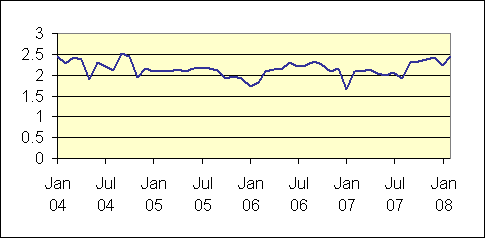 |
Speculation as to possible factors seems to be the one thing we have in abundance. But what of those who say, like Joe Friday, “all we want are the facts.” Well, here are some. On the same day that crude oil gained 4.8% in price, gold was up 2.6% and copper shot up 5.8%. The latter in particular could have little to do with geopolitical events in Venezuela, Nigeria, Iraq, or any other scary place, but instead seems better accounted for by the following:
Copper rose beyond $8,000 a ton in London to a four-month high on speculation that China, the world’s largest user, will import more of the metal. Aluminum and lead also climbed….Copper has risen 21 percent this year as demand from China is forecast to expand 11 percent in the first quarter, following last year’s 17 percent jump.
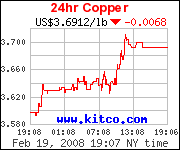
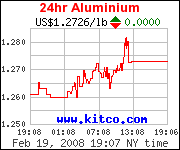
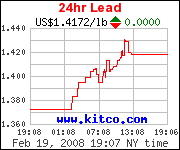
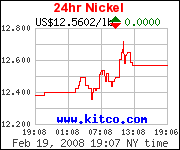
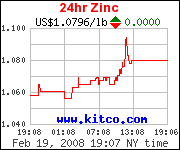
[pictures courtesy of Kitco]
Aha, I hear some of you saying, so it’s all driven by expectations of resurging inflation! But before you declare the case to be closed, let me bring up one more fact that I believe may be quite pertinent. The expected fed funds rate implied by the April fed funds futures contract shot up 7-1/2 basis points Tuesday. Whereas traders last Friday were anticipating an average fed funds rate of 2.415% for April, Tuesday’s closing price brings that up to 2.49%.
Now, if you really try, you can still fit that last little nugget into your inflation meme. Say, traders know that $100 oil will scare the Fed into worrying more about inflation so Bernanke will have to slow down lowering rates. Or something.
Or you could try a line that to me seems a bit more natural: incoming data aren’t confirming the initial notion held by many that a recession began in December. If so, it means that the Fed’s easing will come to an end within a few months, and that the demand for oil, copper, and most everything else is going to be stronger than many of us had been anticipating as of a few weeks earlier.
If so, $100/barrel might not be as bad news as you thought.
Technorati Tags: oil,
oil prices,
Saudi Arabia,
OPEC,
Venezuela,
Iraq,
Nigeria,
recession
I promise this will be last magic eight ball comment. Honest.
I asked the magic eight ball: “Question: will oil reach $110 in the next two months?”
Response: “Outlook not so good.”
So at least we’ve put a price on the upper end for the time being.
Then I asked it: “Question: will oil ever drop below $100 again?”
Response: “My sources say no.”
One consideration: You happen to know who the “sources” are for the online magic eightball? Might want to check with them.
PS: I won’t be offended if you delete this silly comment. I had nothing constructive to add to your analysis. I was surprised as anyone else to see it jump back to $100.
Let me report the current pricing of an even more significant commodity, Trader Joe’s 12 oz Whole Wheat Pita bread.
19February2008 … 1.69.
1January2007 … 0.69.
So, General Specific, what does the ball say regarding the possibility of this Pita ever selling below 1.50?
The producers of oil and other commodities are simply no longer willing to provide units of their outputs for anything other than increasing quantities of the commodity that Benjamin “Zimbabwe” Bernanke is debasing.
When the PBoC is freed to decide that this absurd game has gone on long enough (probably in Q3) the support for long Treasury paper will end and we will find out just where we stand.
And won’t that be fun?
PEAK OIL.
Just testing the comments!
Welcome back, CoRev. Sorry you had problems with the system earlier.
Some info on my “Tech” problems. I used the T_I_N_Y_U_R_L url creator, and was automatically put on the banned list. Or at least that’s JH’s story and he has stuck to it!
Anyway, if you enter something that locks out your comments, wait 6 days and the cache will be cleared so that you can continue to comment. BTW, I tried nearly everything I could on my end. Changed user names, IPs, and even computers with all above changed. Nothing worked.
“So, General Specific, what does the ball say regarding the possibility of this Pita ever selling below 1.50?”
I don’t know, but oil is below $100 again, and magic eight ball didn’t think it would be. So much for magic eight ball.
The sources of the magic 8 ball are here:
http://www.peakoil.com
http://www.theoildrum.com
We have been expecting oil to reach $100 a barrel for five years at least, long before you guys figured it might be an issue some day.
Boy, those prices at the pump are jumping: 5% increase in two weeks at the gas stations that I use.
Oh, there’s a recession underway: same store sales growth of 1.6% nominal in Q4 at the world’s largest retailer, Wal-Mart; net of Q4 annualized CPI of 6.4%, and we have real sales falling 4.8% on a same store basis.
http://money.cnn.com/2008/02/19/news/companies/walmart_earnings/?postversion=2008021908
How about that 6.8% annualized growth rate in CPI over the last three months; ouch!
http://www.bls.gov/news.release/pdf/cpi.pdf
Falling real sales, galloping inflation. What fun.
What percent of reserves did Exxon replace? 76% Peak oil may be closer than people think. I heard a magic number of $122 by some trader this morning (noise, I know).
Hundred Dollar Oil
HUNDRED DOLLAR OIL….Via Brad DeLong, Jim Hamilton reviews some recent economic data and suggests that although oil at $100.01 might indeed be a sign of surging inflation, there are other possibilities too:[Alternatively] you could try a line that to …
Accelerating Inflation
All Items are showing inflation accelerating in the past couple of months. The biggest driver is the accelerating inflation in transportation costs which absolutely dwarves any other category’s changes. The only area which is showing very low inflat…
“We have been expecting oil to reach $100 a barrel for five years at least, long before you guys figured it might be an issue some day.”
Doly: Just for clarification, many of the people here follow the topic of peak oil very closely, including JDH. There are no big surprises here in the coarse sense.
I happen to believe in the theory of peak oil and have been studying it for maybe five years or longer, looking at economics, including energy based or ecological economic theories as well.
I used to visit peakoil.com regularly years ago but found it cluttered with noise and hysteria (and not a few too many gun nuts, survivalists, and xenophobes and racists). People can pick through it to find useful stuff but I’ll rely on longer term analysis as I find here or at the oildrum.com.
But…Matthew Simmons made predictions for end 2006, as an example, that were totally bunk. He lost a lot of credibility in my mind because of it. He made a statement that I think could not be backed by real data. And he does the peak oil community disservice by making such statements (like the Simon/Ehrlich bet years ago).
My surprise is not that oil is jumping around $100/barrel (though the specifics of price always baffle me a bit). My surprise is the recent movement of the market. Nobody can easily predict this stuff.
Not even magic eight ball.
We should WANT oil to hit $120/barrel and stay above that. Here is why.
Tough love is the answer.
Regarding those price jumps at the pump, they probably have more to do with the refinery explosion in Texas on Monday.
Re: Peak Oil.
As far as I can assume, while the price of other commodities have increased in value, the market has responded by supplying more. There’s more gold, more lead, more copper, zinc and lead being mined than ever before. This is the natural response to prices getting this high.
But what about oil? I check http://www.theoildrum.com/ everday and I have seen graphs that indicate that oil production has not increased for the past two years. Why is it that oil producers are not supplying the oil that the market is valuing so highly? Isn’t that the normal market response?
The graphs I have seen from The Oil Drum over the past year show that oil is just not being produced at the level that the market demands. This is why the oil price has climbed so high.
And why are oil producers not pumping the oil out to meet this demand? Simple. They can’t. The taps are open all the way and the pumps are running at full bore, but the oil isn’t coming out any faster. Oil has reached the limit of its production, and this production will begin to decline as years go by. That’s Peak Oil.
“one salient oversight: And why are oil producers not pumping the oil out to meet this demand? Simple. They can’t. ”
I’ve long considered a few possibilities as we go forward. I’m not an economist, and always forget the lingo, but in essence:
1. They (whoever they is) can’t raise production because of geological constraints.
2. They can’t raise production because of above ground constraints (e.g. oil service industry, politics)
3. They refuse to raise production because it’s a limited resource and they see the end in sight and therefore why sell it at bargain basement prices.
4. They refuse to raise production because they hate our guts.
5. They refuse to raise production because even if they did it wouldn’t affect the price that much because the futures markets are onto the whole limited resources meme–rightly or wrongly–and driving the price bubbliciously out of control.
My knee-jerk response is that it’s a combination of 1-3, a little of 5 (not much, an teensy amount), and not 4 at all.
But what do I know (now that magic eight ball has proven defective).
“Crude oil for March delivery rose 73 cents to finish at a new record closing high of $100.74 a barrel on the New York Mercantile Exchange. ”
Hmm. Maybe I was a little hard on magic eight ball.
Strong growth in the rest of the world is obviously driving oil demand. But US demand has had little or nothing to do with it as real US oil imports–crude and refined products –have been flat to down for years.
Related to my point #5 above, one consideration/concern: with money no longer flowing into real estate, where will stupid money go? And by that I mean–it could be that, up to this point, smart money was chasing oil and other commodities for good reason, that they aren’t a bubble–as many have tried to argue. Maybe the real bubble in oil and commodities is yet to come as unreflective money looks at the charts for them and decides–“always goes up, new paradigm, can’t lose.”
great point about the 24 hr. commodity charts.
when i see all of those commodities jump like that in a 24 hr period it seems like we could be seeing a big position put on by the likes of a swf, large hedge fund (or one going broke on the short side) or some other really large player(s).
al-sadr looks like saber rattling. amedinijidad will visit iraq in early march. if al-sadr lights the place up going into that visit he’s on the s&*% list in tehran. bad idea on his part.(doesn’t mean the markets see it my way though)
Spencer, so you think that China can keep roaring along even if the U.S. goes into recession?
On the China/recession thing. I’ve seen several economists argue that US recessions are less severe now than back in the day because we are now a service economy and all the nasty volatile manufacturing has gone elsewhere.
Wouldn’t that imply that Asia, and China in particular, would be extremely vulnerable in a global slowdown, since so much of the manufacturing is done there now?
The inflation hypothesis doesn’t seem that tortured. If we have exogenous evidence that inflation pressures are not decreasing then this drives up the commodity prices and down expectations of Fed easing.
One Salient, if you read The Oil Drum every day you must have missed their most recent Oilwatch Monthly report at
http://www.theoildrum.com/node/3557
“1) Plateau production – For the second consecutive month world production has increased significantly, confirming the end of the plateau that began in 2005.”
As far as the reason why production has not increased as much as some have anticipated, the truth is that economics predicts exactly this behavior for any commodity with a fixed natural resource base. This would include oil as well as copper and the other minerals. Rational, profit-maximizing owner/producers of such resources will husband them and draw them out slowly over the years, knowing that future scarcity will make them that much more valuable. It’s not because they can’t produce more, it’s just that it is not as profitable to produce more than is necessary today, knowing that profits will be so much greater tomorrow.
The real mystery is why this phenomenon has not shown up more in the past, not why it is occuring (IF it is occuring) today.
It really isn’t rocket science.
Before Nixon took us off gold the bbl oil:oz gold ratio was about 14:1. Recently, with increased world demand the ratio is more like 11:1. With Gold at $950 oil should be around $90. A $10 premium for anticipated increased demand and increased inflation actually doesn’t seem out of the question. $100 oil is just no big deal.
“Predicting oil prices is a pretty risky business. But my best guess is that, for the time being at least, they have peaked.”
-JDH, last line in Nov. 27th post.
Oil was at $94 and had peaked at $98 four days earlier.
Since then (less than 2-1/2 months) oil has topped that peak twice. Remarkable how bad your foresight was and how quickly you proved yourself right when you stated how foolish forecasting is.
Yet no mention of this in your story today.
Instead we have:
“…there’s an embarrassing oversupply of theories to explain why.”
Sounds like sour grapes to me.
JAS, if I said that oil had peaked at $98, and it turns out that oil in fact went to $100, you would describe that as “remarkable how bad your foresight was”?
I wouldn’t.
You weren’t the only one who got it wrong. Goldman Sachs made a big deal about closing out their oil positions at the end of October before it hit $94.
If you were a construction worker and you mentioned oil peaking over a cup of coffee – No I wouldn’t mention your foresight. But you are an economics professor who has a well known blog that frequently focuses on oil. It was also the last sentence in that particular post, so it is not as if you were simply saying it in passing. You meant something at the time
I also mention it because I expected to see it mentioned in the current post. I would have liked to see serious analysis of why you called it wrong 3 months ago. It isn’t simply a matter of $98 to $100, that is being slightly deceptive. The reality is that oil has made a round trip to $86 and back in that time and peaked twice more.
I check your blog frequently, I respect your work, and obviously remember the things you say. That’s a compliment.
But in the oil world, and especially the peak-oil world there are far too many predictions thrown around, and I cringe everytime I see them. I think people wouldn’t make so many if they were honest and aware of their track records.
The economic scene (at least on Bloomberg and CNBC) is largely about throwing guesses and predictions around 90% of which turn out to be wrong and past mistakes are usually ignored. It is an easy trap to fall into. I don’t like to see people go down that path.
JAS
JAS: I think it premature to say anything about the statements made by JDH in December 2007. I raised an issue about them when he made them, but my point–while not well phrased–was about the longer term–say 12 months.
JDH made a reasonably accurate statement regarding oil prices in, if I remember, end 2006 and that held for quite a while. And that was my point–that after that “quite a while”, say 8 months, it’s hard to say where they’ll be.
“Quite a while” as a time unit hasn’t passed-by since the Dec 2007 prediction.
We may be wasting words on noise.
Matthew Simmons made a VERY BAD prediction. I don’t think the same can be said for JDH. At least in what we’re discussing right now.
I’m still frankly baffled by your position, JAS. I don’t see that my prediction has been proved wrong at all, though I’m certainly open to the possibility that it may yet prove to be wrong. It is true that $98 wasn’t the exact peak, and it is true that one would expect to see me offer in this post my interpretation of why that is, and it is true that in this post I did offer such an interpretation, namely, the global economy appears to be growing stronger at this point than I was anticipating it would be as of last December.
Oil is priced in Dollars. Weak dollar, means suppliers will demand more dollars for the same goods. Easy.